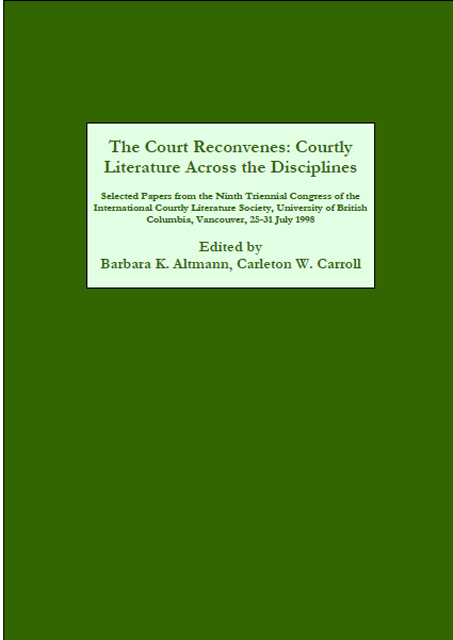 The Court Reconvenes
The Court Reconvenes To Love or Not to Love
Published online by Cambridge University Press: 31 March 2023
Summary
When Thomas's Tristran considers marriage, adequate terms escape his deliberation. He neither loves nor hates Ysolt of the White Hands; he loves her beauty and name (250–51). He does not hate Queen Ysolt, but he is unable to have her (208–09; 232–35). He wants Ysolt of the White Hands because of his want for the Queen. Systematically, love and hate fail as antithesis. To want (voleir) and to be able (poeir), repeated throughout his deliberation, refuse alignment.
As Per Nykrog argues, self-conflict organizes the narratives of the first generation of Old French romancers. It distinguishes the literary from the oral, the roman from the chanson de geste (609). In romance, a hero confronts his own values. Although mirroring aspects of the modern novel for which Nykrog argues, self-conflict specifically evokes a medieval academic framework. In that the hero's reaction to conflict frequently entails deliberation leading to action, the early romancers fictionalize practical reasoning.
Although the term ratio practica comes into usage in the thirteenth century, learned attempts to systematize practical philosophy and to incorporate ethics into curriculum historically coincide with the first works of the romancers. Likewise, whether before or after the translation and dissemination of Aristotle's Ethics, the speaker wrestles with antithetical and equal claims under circumstances that necessitate action. The representation of deliberation formulates personal decisions as accountable to reasons, if not to principles, for actions. They are accessible to the understanding of others.
Natural law, the category under which medievals treat practical reasoning, also influences the tenor and content of its twelfth-century fictionalization. Academics attempt to delineate its terms and precepts. According to Anselm of Laon, for example, it precedes Mosaic law and issues from ratio naturalis (Lottin 2: 71). It depends on doing to others as you would want done to you; it teaches what to do and what to avoid. In 1140, Gratian adopts these precepts taken from the school of Anselm and repeated by Hugh of St. Victor and adds the political distinction between ius civile, which applies to an individual people, and ius naturale, which applies to all nations (“commune omnium nationum”; 2: 73). In so doing, he explicitly connects moral and legal action by means of a distinction the romances explore.
- Type
- Chapter
- Information
- The Court ReconvenesCourtly Literature across the Disciplines: Selected Papers from the Ninth Triennial Congress of the International Courtly Literature Society, University of British Columbia, Vancouver, 25-31 July 1998, pp. 231 - 238Publisher: Boydell & BrewerPrint publication year: 2002


